 ★★★
★★★
“French kissing in the USA”
To say I approached this show in a roundabout way would be an understatement. 15 years after its original screening, after three separate movie versions and two seaseons of the largely unrelated version of the story starring Maggie Q, I finally got round to it. So, bearing tht in mind, it’s a different beast from what I expected – mostly because it’s a lot less action-oriented. Peta Wilson, as lost soul turned government operative Nikita, looks like she could potentially kick your arse, but (largely for budgetary reasons, I believe) there’s only token moments of hand-to-hand action: the focus is much more on spycraft, undercover work and deceit, rather than full-on assaults. There are still occasional sequences, but even these tend to involve relatively brief gun-battles, not the martial arts brawls which are one of the new version’s trademarks.
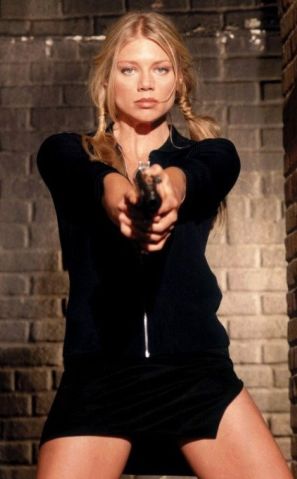 The other chance is that Section One, their version of Division, is not malicious – at least not in the same way. It’s certainly a heartless organization, which is utterly ruthless, and prepared to dispose of anyone who may interfere with their actions, but it’s more an awareness that when you’re dealing with terrorists, organized crime or other threats to the country and world, you can’t be unwilling to get your hands dirty. It leads to a significant bleaker overall tone, and is amazingly prophetic, given this was screened well before 9/11 led to this attitude become a necessary part of national security. Early on, it’s established that you can never trust Section heads Operation (Glazer) and Madeleine (Watson, who was also part of the remake, playing Senator Pierce – her given name there was also Madeleine), to the extent that their deceit becomes almost a cliché.
The other chance is that Section One, their version of Division, is not malicious – at least not in the same way. It’s certainly a heartless organization, which is utterly ruthless, and prepared to dispose of anyone who may interfere with their actions, but it’s more an awareness that when you’re dealing with terrorists, organized crime or other threats to the country and world, you can’t be unwilling to get your hands dirty. It leads to a significant bleaker overall tone, and is amazingly prophetic, given this was screened well before 9/11 led to this attitude become a necessary part of national security. Early on, it’s established that you can never trust Section heads Operation (Glazer) and Madeleine (Watson, who was also part of the remake, playing Senator Pierce – her given name there was also Madeleine), to the extent that their deceit becomes almost a cliché.
There are some direct nods to Besson’s movie: her first assignment is to murder a target in a crowded restaurant, and the bathroom assassination crops up in a later episode. On the other hand, there is one significant difference from the original film, in that Nikita here is genuinely innocent of the crime for which she is sentenced, simply happening to be in the wrong place at the wrong time. Her refusal to engage in the actions Section demands of her is a strong thread of the first season, with a reluctance to compromise her moral code being pitted against Section’s desire to control her for their own ends. Early on, she risks “cancellation” (termination with extreme prejudice) more than once, by disobeying orders, usually to protect others from Section action.
Another area in which this show differs from the current version, is a much more pronounced use of music. There are fairly lengthy sequences, several minutes on occasion, where scenes unfold over almost all of a song. A soundtrack CD was about the only piece of merchandise given any wide-scale release by Warner Bros, including the title track by X-Files composer Mark Snow, as well as songs by Depeche Mode and Morcheeba. Also popping up in the first season, are Morcheeba, P.J. Harvey, Sister Machine Gun and several tracks by neo-classical/industrial band In The Nursery, whom I coincidentally went to see in Hamburg, back around the time these episodes first aired. It’s certainly a trademark of the show, and is an aspect I consistently enjoyed.
 On the other hand, apart from the lack of action, the angle I liked least was the relationship between Nikita and her handler/fellow agent, Michael (Dupuis). I’ll come right out and say it: I hate ‘shippers, and storylines that pander to them are nothing more than an irritant to me, especially in shows which I watch for action, where they do little except interfere with the good stuff, in my humble opinion. [We’ve seen this in the new incarnation, where the show has disintegrated from one of the best shows on TV, into little more than Mr. and Mrs. Smith And Friends.] I’m definitely a “noromo”: If I wanted unresolved sexual tension and relationship nonsense, I’d watch daytime soap operas. Right from the first time Nikita and Michael meet, it’s doe-eyed heaven, even though there is obviously little or no honesty, trust and anything else on which a genuine relationship could ever be founded.
On the other hand, apart from the lack of action, the angle I liked least was the relationship between Nikita and her handler/fellow agent, Michael (Dupuis). I’ll come right out and say it: I hate ‘shippers, and storylines that pander to them are nothing more than an irritant to me, especially in shows which I watch for action, where they do little except interfere with the good stuff, in my humble opinion. [We’ve seen this in the new incarnation, where the show has disintegrated from one of the best shows on TV, into little more than Mr. and Mrs. Smith And Friends.] I’m definitely a “noromo”: If I wanted unresolved sexual tension and relationship nonsense, I’d watch daytime soap operas. Right from the first time Nikita and Michael meet, it’s doe-eyed heaven, even though there is obviously little or no honesty, trust and anything else on which a genuine relationship could ever be founded.
There are also a number of aspects of the show which now seem undeniably dated, which is always going to be an issue when a series is trying to be “cutting edge”. Most obvious is the technology – an early episode has tech wiz Birkoff explaining about IRC, something now so passé, an explanation would probably be needed again! – but the opening credits always get a chuckle, especially the final “morph” at the end, which looks incredibly cheap. Meanwhile, Wilson’s accent drifts in and out without rhyme or reason: at times, she seems straight off Bondi Beach, while at others it’s almost entirely subdued.
The episodic nature of this, with less concentration on an over-riding story arc, is both a strength and a weakness. It frees the creators up for some really good stories, but there’s not much incentive to plug in the next episode – I largely watched them in double-bills, but it took me more than seven months to get through the first season’s 22 shows. I enjoyed the bleakness and emotional chilliness depicted here, which as noted above, is probably more relevant now than then, but the obviously lower production values, and its replacement of high-energy action with dramatic angles that Wilson isn’t quite up to handling, brought its overall entertainment value down significantly. I’m probably just about interested enough to pick up the second season at some point: however, that is not likely to be for a while.
Star: Peta Anderson, Roy Dupuis, Eugene Robert Glazer, Alberta Watson
 This starts with a memorable sequence in which Inoshika Ocho (Ike) fights off a number of attackers, armed only with her umbrella; albeit, an umbrella that is rather more heavily-armed than most. While she succeeds, she ends up losing all of her clothes in the process, leading to some artful staging in which the discarded umbrella is used to hide her naughties bits. Unfortunately, the rest of the film, while occasionally reaching the same levels of unsanity is largely crude and unpleasant. Even the central concept – a gang smuggling drugs in the vaginas of junkies – falls firmly into that category.
This starts with a memorable sequence in which Inoshika Ocho (Ike) fights off a number of attackers, armed only with her umbrella; albeit, an umbrella that is rather more heavily-armed than most. While she succeeds, she ends up losing all of her clothes in the process, leading to some artful staging in which the discarded umbrella is used to hide her naughties bits. Unfortunately, the rest of the film, while occasionally reaching the same levels of unsanity is largely crude and unpleasant. Even the central concept – a gang smuggling drugs in the vaginas of junkies – falls firmly into that category.




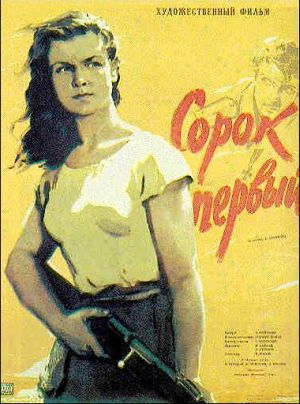 It’s the war between the Bolsheviks and the White Guard. A platoon of the former is left with no route of escape except across the desert to the Aral Sea. They begin the perilous trek, under Commander Yevsyukov (Kryuchkov), aided by the unit’s best sniper, Maria Filatovna (Izvitskaya). During the journey, they capture a White officer, Lieutenant Vadim Govorkha (Strizhenov, who looks kinda like Cary Elwes in The Princess Bride!) who is carrying information vital to his side. The Bolsheviks take him with them, as they head back to HQ, with Maria given the task of guarding him. But when she is separated from her comrades, and left with Vadim to fend for themselves after a storm, duty and loyalty to the cause of Communism becomes conflicted with other less revolutionary emotiona.
It’s the war between the Bolsheviks and the White Guard. A platoon of the former is left with no route of escape except across the desert to the Aral Sea. They begin the perilous trek, under Commander Yevsyukov (Kryuchkov), aided by the unit’s best sniper, Maria Filatovna (Izvitskaya). During the journey, they capture a White officer, Lieutenant Vadim Govorkha (Strizhenov, who looks kinda like Cary Elwes in The Princess Bride!) who is carrying information vital to his side. The Bolsheviks take him with them, as they head back to HQ, with Maria given the task of guarding him. But when she is separated from her comrades, and left with Vadim to fend for themselves after a storm, duty and loyalty to the cause of Communism becomes conflicted with other less revolutionary emotiona. I really wanted to use little barb-wire icons to mark this one, instead of the usual stars, but whenever I typed in “barb wire jpg” into search engines, I always seemed to find myself staring at Pamela Anderson. Yes, get those digressions out of the way early, that’s what I always say…
I really wanted to use little barb-wire icons to mark this one, instead of the usual stars, but whenever I typed in “barb wire jpg” into search engines, I always seemed to find myself staring at Pamela Anderson. Yes, get those digressions out of the way early, that’s what I always say… Thirdly, while they
Thirdly, while they  The only major change here is how
The only major change here is how  ★★★
★★★ The other chance is that Section One, their version of Division, is not malicious – at least not in the same way. It’s certainly a heartless organization, which is utterly ruthless, and prepared to dispose of anyone who may interfere with their actions, but it’s more an awareness that when you’re dealing with terrorists, organized crime or other threats to the country and world, you can’t be unwilling to get your hands dirty. It leads to a significant bleaker overall tone, and is amazingly prophetic, given this was screened well before 9/11 led to this attitude become a necessary part of national security. Early on, it’s established that you can never trust Section heads Operation (Glazer) and Madeleine (Watson, who was also part of the remake, playing Senator Pierce – her given name there was also Madeleine), to the extent that their deceit becomes almost a cliché.
The other chance is that Section One, their version of Division, is not malicious – at least not in the same way. It’s certainly a heartless organization, which is utterly ruthless, and prepared to dispose of anyone who may interfere with their actions, but it’s more an awareness that when you’re dealing with terrorists, organized crime or other threats to the country and world, you can’t be unwilling to get your hands dirty. It leads to a significant bleaker overall tone, and is amazingly prophetic, given this was screened well before 9/11 led to this attitude become a necessary part of national security. Early on, it’s established that you can never trust Section heads Operation (Glazer) and Madeleine (Watson, who was also part of the remake, playing Senator Pierce – her given name there was also Madeleine), to the extent that their deceit becomes almost a cliché. On the other hand, apart from the lack of action, the angle I liked least was the relationship between Nikita and her handler/fellow agent, Michael (Dupuis). I’ll come right out and say it: I hate ‘shippers, and storylines that pander to them are nothing more than an irritant to me, especially in shows which I watch for action, where they do little except interfere with the good stuff, in my humble opinion. [We’ve seen this in the new incarnation, where the show has disintegrated from one of the best shows on TV, into little more than Mr. and Mrs. Smith And Friends.] I’m definitely a “noromo”: If I wanted unresolved sexual tension and relationship nonsense, I’d watch daytime soap operas. Right from the first time Nikita and Michael meet, it’s doe-eyed heaven, even though there is obviously little or no honesty, trust and anything else on which a genuine relationship could ever be founded.
On the other hand, apart from the lack of action, the angle I liked least was the relationship between Nikita and her handler/fellow agent, Michael (Dupuis). I’ll come right out and say it: I hate ‘shippers, and storylines that pander to them are nothing more than an irritant to me, especially in shows which I watch for action, where they do little except interfere with the good stuff, in my humble opinion. [We’ve seen this in the new incarnation, where the show has disintegrated from one of the best shows on TV, into little more than Mr. and Mrs. Smith And Friends.] I’m definitely a “noromo”: If I wanted unresolved sexual tension and relationship nonsense, I’d watch daytime soap operas. Right from the first time Nikita and Michael meet, it’s doe-eyed heaven, even though there is obviously little or no honesty, trust and anything else on which a genuine relationship could ever be founded. Wow. This is dreadful, and I speak as someone who enjoyed its predecessor, appreciating its excessive updating of Little Red Riding Hood. Bright tries to capture lightning in a bottle here, this time going for Hansel and Gretel, but it’s largely a miserable failure, imploding in screeching one-note performances from the two leads and far too many scenes of teenage girls vomiting. Yep. Girls vomiting. The scenario has Crystal Van Meter (Lyonne) sentenced to 25 years in prison, by a judge (a cameo by John Landis) fed-up of her petty criminality. There, she meets fellow desperado Angela “Cyclona” Garcia (Celedonio), a teenage serial killer with even more anti-social tendencies. After much binging and purging, the pair break out and go on the lam, heading for Tijuna and Sister Gomez, whom Garcia believes can solve their problems. But the Sister is not quite what she seems… as should be clear when I tell you she’s played by Vincent Gallo.
Wow. This is dreadful, and I speak as someone who enjoyed its predecessor, appreciating its excessive updating of Little Red Riding Hood. Bright tries to capture lightning in a bottle here, this time going for Hansel and Gretel, but it’s largely a miserable failure, imploding in screeching one-note performances from the two leads and far too many scenes of teenage girls vomiting. Yep. Girls vomiting. The scenario has Crystal Van Meter (Lyonne) sentenced to 25 years in prison, by a judge (a cameo by John Landis) fed-up of her petty criminality. There, she meets fellow desperado Angela “Cyclona” Garcia (Celedonio), a teenage serial killer with even more anti-social tendencies. After much binging and purging, the pair break out and go on the lam, heading for Tijuna and Sister Gomez, whom Garcia believes can solve their problems. But the Sister is not quite what she seems… as should be clear when I tell you she’s played by Vincent Gallo. It isn’t
It isn’t  ★★★★
★★★★ Mark (Lemaire), is a thief on the run from his collaborators after absconding with the loot. He takes refuge in a remote country manor, all but surrounded by water, which he believes to be deserted. Turns out he was almost right. The sole inhabitants are a pair of chambermaids, Eva (Lahaie) and Elizabeth (Mai), but despite his gun, they don’t seem quite as terrified of the intruder as one feels they should be, and tell him they are expecting some other female visitors later that evening. Elizabeth does take a shine to Mark, and tells him he should leave, but Eva uses her wiles to keep Mark there. The rest of his gang show up, and lay siege to the house, but Eva takes the loot out to them and single-handedly dispatches them, before returning to the manor. As night descends, the visitors finally arrive, and the noose tightens around Mark’s neck, as the truth about the get-together is revealed…
Mark (Lemaire), is a thief on the run from his collaborators after absconding with the loot. He takes refuge in a remote country manor, all but surrounded by water, which he believes to be deserted. Turns out he was almost right. The sole inhabitants are a pair of chambermaids, Eva (Lahaie) and Elizabeth (Mai), but despite his gun, they don’t seem quite as terrified of the intruder as one feels they should be, and tell him they are expecting some other female visitors later that evening. Elizabeth does take a shine to Mark, and tells him he should leave, but Eva uses her wiles to keep Mark there. The rest of his gang show up, and lay siege to the house, but Eva takes the loot out to them and single-handedly dispatches them, before returning to the manor. As night descends, the visitors finally arrive, and the noose tightens around Mark’s neck, as the truth about the get-together is revealed…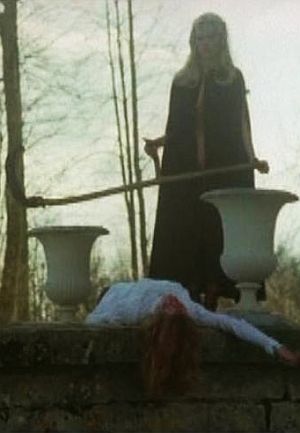 Watching porn stars try to act is often a painful experience, but renowned 70’s XXX starlet Lahaie is perfectly cast here. She plays a feral creature, driven entirely by instinct, and with no qualms about using sex or violence to achieve her aim, of keeping Mark in the house for the night. The sight of her stalking across the bridge which forms the castle’s sole entrance, wielding a blood-stained scythe almost the same size as the actress, is one that will stick with you. The film does betray its cheapness with some fairly crappy effects [you’re going to have someone hacked apart with a scythe, you should do better than some red gunk on the throat], but more than makes up for it with a parade of strong, confident and sensual female characters. Mark is by no means an idiot or a weakling, but from the moment he arrives in the house, it’s clear he’s completely beyond his depth, out-maneouvered at every turn by the women.
Watching porn stars try to act is often a painful experience, but renowned 70’s XXX starlet Lahaie is perfectly cast here. She plays a feral creature, driven entirely by instinct, and with no qualms about using sex or violence to achieve her aim, of keeping Mark in the house for the night. The sight of her stalking across the bridge which forms the castle’s sole entrance, wielding a blood-stained scythe almost the same size as the actress, is one that will stick with you. The film does betray its cheapness with some fairly crappy effects [you’re going to have someone hacked apart with a scythe, you should do better than some red gunk on the throat], but more than makes up for it with a parade of strong, confident and sensual female characters. Mark is by no means an idiot or a weakling, but from the moment he arrives in the house, it’s clear he’s completely beyond his depth, out-maneouvered at every turn by the women.
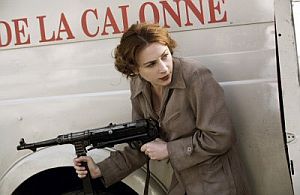 It’s a solid piece of action/drama, which managed to keep both of us awake, despite a session earlier in the evening at the “all you can eat” fish fry; normally, that requires 30,000 Volts to keep us from sliding into post-gluttony unconsciousness. I think Chris enjoyed the movie a little more: I was somewhat on the fence about giving it the seal, finding some of the plotting a little convoluted and occasionally implausible, but her endorsement of this as “great” provided sufficient impetus. Marceau is particularly good, exuding steely resolve to hold the team together, and Bleibtreu makes an excellent foil, coming across as equally smart and committed as Louise. Their conflict is the glue that binds the story together, and makes it one of the best efforts in the wartime heroine genre to date.
It’s a solid piece of action/drama, which managed to keep both of us awake, despite a session earlier in the evening at the “all you can eat” fish fry; normally, that requires 30,000 Volts to keep us from sliding into post-gluttony unconsciousness. I think Chris enjoyed the movie a little more: I was somewhat on the fence about giving it the seal, finding some of the plotting a little convoluted and occasionally implausible, but her endorsement of this as “great” provided sufficient impetus. Marceau is particularly good, exuding steely resolve to hold the team together, and Bleibtreu makes an excellent foil, coming across as equally smart and committed as Louise. Their conflict is the glue that binds the story together, and makes it one of the best efforts in the wartime heroine genre to date.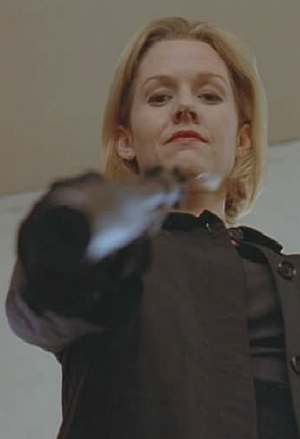 Ward (whom we’ll watch in anything, as payment for the enjoyment Tremors has given us) plays John McWhirter, a hard-bitten journalist with a fondness for the bottle, who is still trying to put behind him an incident when he was a young radical, that led to his friends being sent to jail for long terms, while John escaped doing time. He’s looking into the murder of an industrialist by Palestinian terrorists, when said friends show up, asking him to hide a woman (Ticotin) from the authorities for a few days, describing her as an activist in Shining Path, a Peruvian rebel group. Turns out she’s not who she seems, and it also turns out John had more to do with his friends’ arrests, thirty years ago, than it initially appeared. With enemies in the FBI, led by Robert Lecker (Plummer), an ally in the CIA, and a female assassin (Miller, right) out to tidy up all the loose ends, McWhirter has to decide whether to do what’s right, what’s easy, or what’s best for himself – and those might be three mutually exclusive options.
Ward (whom we’ll watch in anything, as payment for the enjoyment Tremors has given us) plays John McWhirter, a hard-bitten journalist with a fondness for the bottle, who is still trying to put behind him an incident when he was a young radical, that led to his friends being sent to jail for long terms, while John escaped doing time. He’s looking into the murder of an industrialist by Palestinian terrorists, when said friends show up, asking him to hide a woman (Ticotin) from the authorities for a few days, describing her as an activist in Shining Path, a Peruvian rebel group. Turns out she’s not who she seems, and it also turns out John had more to do with his friends’ arrests, thirty years ago, than it initially appeared. With enemies in the FBI, led by Robert Lecker (Plummer), an ally in the CIA, and a female assassin (Miller, right) out to tidy up all the loose ends, McWhirter has to decide whether to do what’s right, what’s easy, or what’s best for himself – and those might be three mutually exclusive options. Certainly one of a kind, this coming-of-age film tells the story of Aicha (Turan), a Muslim girl born of Turkish parents, who is obsessed with learning martial arts – the last thing her father wants. This thoroughly unfeminine interest, in the eyes of her community, is carried out in secret, but Omar (Banissi), a friend of her brother’s fiancee’s family finds out, and is thoroughly unimpressed. “I don’t fight girls,” he says dismissively, when ordered to spar with Aicha, and this leads to his ejection from the club by their teacher (Xian). When he confronts Aicha at the engagement party, the resulting argument becomes a brawl, and leads to the breaking off of the engagement – which is doubly unfortunate, as the bride-to-be is discovered to be pregnant. Meanwhile, Aicha has to prepare for an upcoming tournament, alongside her training partner, Emil (Melville) – and for which Omar has also signed up as a contestant.
Certainly one of a kind, this coming-of-age film tells the story of Aicha (Turan), a Muslim girl born of Turkish parents, who is obsessed with learning martial arts – the last thing her father wants. This thoroughly unfeminine interest, in the eyes of her community, is carried out in secret, but Omar (Banissi), a friend of her brother’s fiancee’s family finds out, and is thoroughly unimpressed. “I don’t fight girls,” he says dismissively, when ordered to spar with Aicha, and this leads to his ejection from the club by their teacher (Xian). When he confronts Aicha at the engagement party, the resulting argument becomes a brawl, and leads to the breaking off of the engagement – which is doubly unfortunate, as the bride-to-be is discovered to be pregnant. Meanwhile, Aicha has to prepare for an upcoming tournament, alongside her training partner, Emil (Melville) – and for which Omar has also signed up as a contestant.